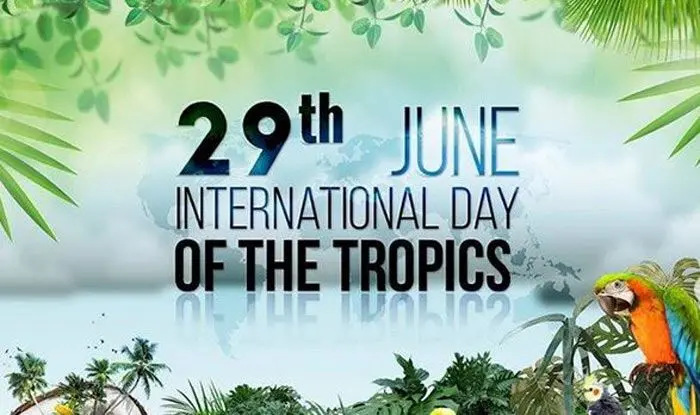On June 29th, nations across the globe join together to observe the International Day of the Tropics, a day dedicated to highlighting the unique challenges and opportunities faced by countries situated in the tropical region. This annual celebration serves as a platform to raise awareness about the importance of the tropics in global sustainability, biodiversity, and economic development.
The Significance of the Tropics:
The tropics encompass a vast expanse of land and sea, stretching roughly 23.5 degrees north and south of the equator. This region is characterized by its warm climate, lush vegetation, and rich biodiversity. The tropics are home to over 40% of the world’s population and contain some of the planet’s most diverse ecosystems, including rainforests, coral reefs, and mangrove forests.
Biodiversity Hotspot:
The tropics are renowned for their unparalleled biodiversity, harboring a staggering array of plant and animal species. From the Amazon rainforest in South America to the Congo Basin in Africa and the islands of Southeast Asia, the tropics are teeming with life. These ecosystems provide essential ecosystem services, including carbon sequestration, water regulation, and pollination, which are vital for global ecological balance.
Cultural Heritage and Diversity:
The tropics are not only biologically diverse but also culturally rich and diverse. Indigenous peoples and local communities have inhabited tropical regions for millennia, developing unique traditions, languages, and knowledge systems that are deeply intertwined with their natural surroundings. International Day of the Tropics celebrates this cultural heritage and promotes respect for indigenous rights and traditional knowledge.
Challenges Faced by Tropical Nations:
Despite their natural wealth, countries in the tropics face numerous challenges, including poverty, environmental degradation, and climate change. Deforestation, habitat loss, and unsustainable land use practices threaten the integrity of tropical ecosystems, jeopardizing the livelihoods of millions of people who depend on them for food, water, and shelter.
Climate Change and Resilience:
The tropics are particularly vulnerable to the impacts of climate change, including rising temperatures, changing rainfall patterns, and more frequent extreme weather events. Coastal communities are at risk from sea-level rise and storm surges, while inland areas may face droughts, floods, and heatwaves. International Day of the Tropics underscores the importance of building resilience and adapting to the impacts of climate change in tropical regions.
Sustainable Development Goals:
The United Nations’ Sustainable Development Goals (SDGs) provide a framework for addressing the challenges facing tropical nations and promoting sustainable development. Goals such as zero hunger, clean water and sanitation, climate action, and life on land are especially relevant to tropical regions, where poverty, environmental degradation, and inequality are prevalent.
Collaborative Action and Partnerships:
International Day of the Tropics encourages collaboration and partnerships among governments, businesses, civil society organizations, and local communities to address the complex challenges facing tropical nations. By working together, stakeholders can develop innovative solutions, promote sustainable practices, and safeguard the natural and cultural heritage of the tropics for future generations.
International Day of the Tropics is a reminder of the critical importance of this ecologically and culturally rich region to the well-being of our planet and its people. As we celebrate this day, let us reaffirm our commitment to protecting and preserving the tropics, promoting sustainable development, and ensuring a brighter future for all who call this diverse and vibrant region home.
30th June: Exploring the Cosmos: Celebrating International Asteroid Day
On June 30th, space enthusiasts and scientists around the world come together to celebrate International Asteroid Day, a global event dedicated to raising awareness about asteroids and the importance of planetary defense. This annual observance commemorates the anniversary of the largest asteroid impact in recorded history, the Tunguska event, which occurred on June 30, 1908, in Siberia, Russia.
Understanding Asteroids:
Asteroids are rocky remnants left over from the formation of the solar system, ranging in size from small boulders to giant mountains. They orbit the sun primarily in the asteroid belt between Mars and Jupiter but can also be found throughout the solar system. Studying asteroids provides valuable insights into the early history of our solar system and the processes that shaped the planets.
Planetary Defense:
While most asteroids orbit harmlessly in space, some pose a potential threat to Earth if their paths intersect with our planet’s orbit. International Asteroid Day raises awareness about the importance of planetary defense efforts aimed at identifying, tracking, and mitigating the risk of asteroid impacts. By monitoring asteroids and developing strategies for deflecting or destroying them, scientists can help protect Earth from potential catastrophic events.
Impact of Asteroid Collisions:
Asteroid impacts have had significant impacts on Earth throughout its history, shaping the planet’s geology and even influencing the course of evolution. The Tunguska event, for example, flattened thousands of square kilometers of forest, while the Chicxulub impact is believed to have caused the mass extinction of dinosaurs. International Asteroid Day serves as a reminder of the potential consequences of asteroid collisions and the importance of preparedness.
Scientific Research and Exploration:
International Asteroid Day celebrates the advancements made in asteroid research and exploration. Scientists use telescopes, spacecraft, and ground-based observatories to study asteroids up close, analyzing their compositions, shapes, and orbits. Missions such as NASA’s OSIRIS-REx and Japan’s Hayabusa2 are actively exploring asteroids to collect samples and gain insights into their origins and properties.
Public Outreach and Education:
International Asteroid Day engages the public in discussions about asteroids and space exploration through various outreach activities, including public lectures, exhibitions, and educational programs. By raising awareness and promoting scientific literacy, the event inspires curiosity and fosters a greater appreciation for the wonders of the cosmos.
Collaborative Efforts:
International Asteroid Day brings together scientists, policymakers, educators, and space enthusiasts from around the world to collaborate on asteroid-related initiatives. International organizations such as the United Nations and the International Astronomical Union support these efforts by coordinating research, sharing data, and developing international agreements on planetary defense.
Looking to the Future:
As we celebrate International Asteroid Day, we look to the future with optimism and determination. Continued scientific research and technological advancements will enable us to better understand and mitigate the risks posed by asteroids. By working together as a global community, we can ensure a safer and more secure future for our planet and future generations.
International Asteroid Day is a testament to humanity’s curiosity, resilience, and collective efforts to explore and understand the cosmos. As we reflect on the importance of planetary defense and the potential impact of asteroid collisions, let us continue to support scientific research, inspire future generations of explorers, and strive to safeguard our planet from the forces of space.








